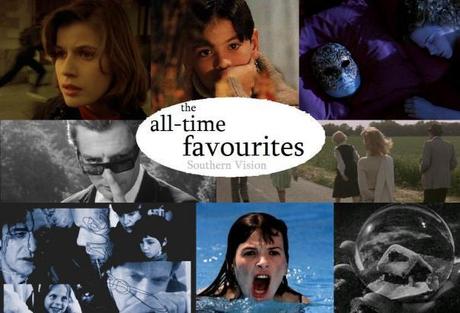
Welcome to the All-Time Favourites Series. This series examines 25 of the greatest films I’ve ever seen, looking at them in depth with analyses of what makes them great, and cutting down to the most basic level, looking at plot, cinematography, writing, direction, acting and other things, to see what makes these great films tick. For more info on the series, read this. This week’s All-Time Favourites post is on Federico Fellini’s 1963 film 8 1/2.
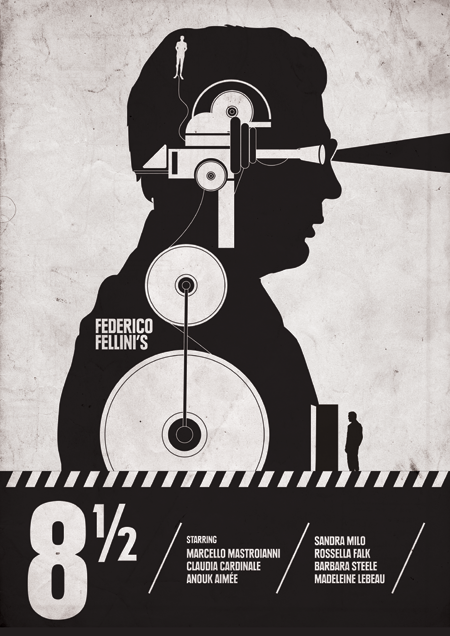
The two best films about filmmaking are Francois Truffaut’s Day for Night and Federico Fellini’s 8 1/2. While the filmmaker in Day for Night cherished and reveled in being on set, and took advantage of every moment, the filmmaker in 8 1/2 (played excellently by the cool-oozing Marcello Mastroianni) is desperate to escape the set. The film opens with him daydreaming, which soon turns into a nightmare as he is suffocated in a car and then when he escapes into the clouds, he is tugged back to Earth by producers who are eager to see him make another movie when all he wants to do is be free from work and business.
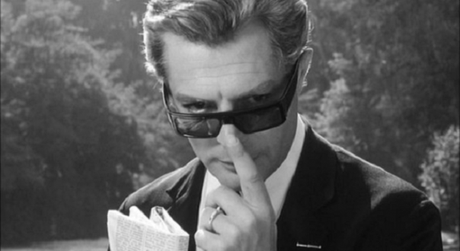
His latest film is a big budget science-fiction epic that doesn’t look promising. He is distraught to discover that his efforts to make a film that he was happy with and that pleased others are futile. The producers scold him for his bad movie, saying “it has none of the advantages of an avant-garde film, but all of the shortcomings.” In one impassioned monologue, he fraughtfully admits “I thought my ideas were so clear. I wanted to make an honest film. No lies whatsoever. I thought I had something so simple to say, something useful to everyone. A film that could help bury forever all those dead things we carry inside ourselves. Instead, I’m the one without the courage to bury anything at all. When did I go wrong? I really have nothing to say, but I want to say it all the same.” No one understands his work and they probably don’t want to. I can think of a lot of filmmakers who feel this way.
He attempts to escape with sex and alcohol, but these things seem more to offend him than please him. He has grown tired of his wife, who he attempts painfully to convince he is not cheating on, and his mistress has become tiresome and is too foolish and idiotic to respect. One day he sees an actress (Claudia Cardinale) and wants her, much like the character Mastroianni played in Fellini’s previous film La Dolce Vita also lusted for an actress. She likes him, but perhaps he is too tormented by his own failure to be acceptable that their relationship would be painful and short if it even began.
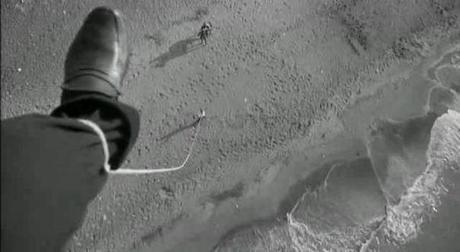
To escape his world, he sinks into increasingly bizarre daydreams, as well as painful and beautiful memories of his childhood. His memories include an encounter with a prostitute whom his friends payed to “do the rhumba, Saraghina!” and his subsequent punishment from the church that schooled him and his ashamed mother. And his fantastic daydreams include him coming home to a mansion housing all the women he has ever loved or lusted after, concluding memorably with an unforgettable image of him cracking a whip to gain control over them. Is this misogynism? No. It’s simply a confused man’s attempt to understand the mystery of women, and throughout the film as he wants the actress more and more, we see the true nature of his frail relationships, and when the pressure turns out to be too much, the film concludes with a magical carnival, in which the entire cast of the film dance to music.
Federico Fellini directs with ease, allowing his cast and crew to glide through the scenes. He is known for playing music on the set (he dubbed all the audio for his films afterwards), and this is why the actors seem so jovial and upbeat. One of the film’s early scenes features uses of classical music in such a brilliant, memorable manner. Wagner’s “Ride of the Valkyries” plays in the background as Mastroianni walks into a garden party; the classical tune, which would become more famous for its use in Apocalypse Now, is even better here in setting the tone and mood of an adventurous, engrossing film that never fails to keep the audience gripped and entertained, with its mixture of dark and celestial fantasies and jarring real-life that is still fantastically surreal and entertaining. Fellini’s obsession with circuses and parties really shows here, as his films are as enjoyable and fun as a classic carnival, at which it is easy to imagine a young Fellini grinning at the lights and attractions that would be forever ingrained into his memory and would show in his marvellous, superb motion pictures.
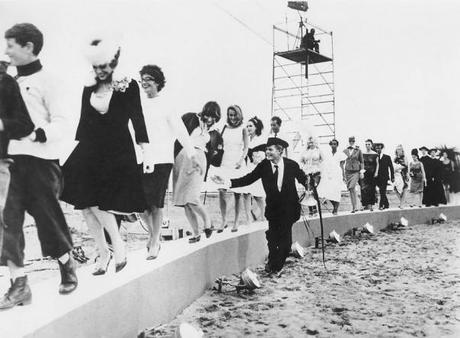
–
What about you? Have you seen 8 1/2, or any of Fellini’s films? Leave a comment below with your thoughts, and after the Christmas break there will be another All-Time Favourites post in January, focusing on another great Ingmar Bergman masterpiece, Persona.

